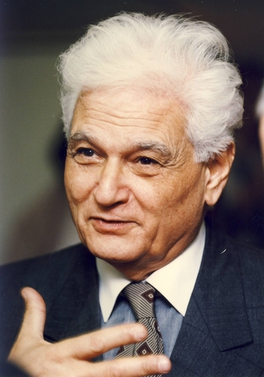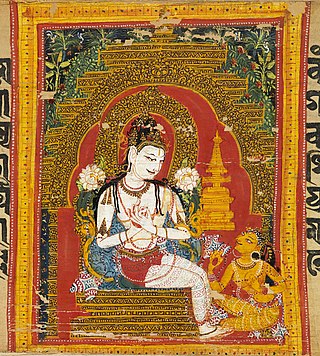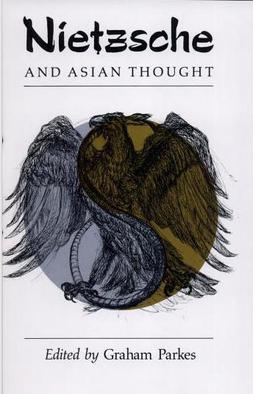Related Research Articles

Jacques Derrida was a French philosopher. He developed the philosophy of deconstruction, which he utilized in a number of his texts, and which was developed through close readings of the linguistics of Ferdinand de Saussure and Husserlian and Heideggerian phenomenology. He is one of the major figures associated with post-structuralism and postmodern philosophy although he distanced himself from post-structuralism and disowned the word "postmodernity".
Buddhism in the West broadly encompasses the knowledge and practice of Buddhism outside of Asia in the Western world. Occasional intersections between Western civilization and the Buddhist world have been occurring for thousands of years. The first Westerners to become Buddhists were Greeks who settled in Bactria and India during the Hellenistic period. They became influential figures during the reigns of the Indo-Greek kings, whose patronage of Buddhism led to the emergence of Greco-Buddhism and Greco-Buddhist art. There was little contact between the Western and Buddhist cultures during most of the Middle Ages but the early modern rise of global trade and mercantilism, improved navigation technology and the European colonization of Asian Buddhist countries led to increased knowledge of Buddhism among Westerners. This increased contact led to various responses from Buddhists and Westerners throughout the modern era. These include religious proselytism, religious polemics and debates, Buddhist modernism, Western convert Buddhists and the rise of Buddhist studies in Western academia. During the 20th century, there was a growth in Western Buddhism due to various factors such as immigration, globalization, the decline of Christianity and increased interest among Westerners. The various schools of Buddhism are now established in all major Western countries making up a small minority in the United States, Europe, Australia and New Zealand.
John David Caputo is an American philosopher who is the Thomas J. Watson Professor of Religion Emeritus at Syracuse University and the David R. Cook Professor of Philosophy Emeritus at Villanova University. Caputo is a major figure associated with postmodern Christianity and continental philosophy of religion, as well as the founder of the theological movement known as weak theology. Much of Caputo's work focuses on hermeneutics, phenomenology, deconstruction, and theology.

East Asian Madhyamaka is the Buddhist tradition in East Asia which represents the Indian Madhyamaka (Chung-kuan) system of thought. In Chinese Buddhism, these are often referred to as the Sānlùn school, also known as the "emptiness school", although they may not have been an independent sect. The three principal texts of the school are the Middle Treatise, the Twelve Gate Treatise, and the Hundred Treatise. They were first transmitted to China during the early 5th century by the Buddhist monk Kumārajīva (344−413) in the Eastern Jin Dynasty. The school and its texts were later transmitted to Korea and Japan. The leading thinkers of this tradition are Kumārajīva's disciple Sēngzhào, and the later Jízàng. Their major doctrines include emptiness (k'ung), the middle way (chung-tao), the twofold truth (erh-t'i) and "the refutation of erroneous views as the illumination of right views" (p'o-hsieh-hsien-cheng).

Masao Abe was a Japanese Buddhist philosopher and religious studies scholar who was emeritus professor at Nara University. He is best known for his work in comparative religion, developing a Buddhist-Christian interfaith dialogue which later also included Judaism. His mature views were developed within the Kyoto School of philosophy. According to Christopher Ives: "Since the death of D. T. Suzuki in 1966, Masao Abe has served as the main representative of Zen Buddhism in Europe and North America."

Charles Edwin Winquist was the Thomas J. Watson Professor of Religion at Syracuse University, and is known for his writings on theology, contemporary continental philosophy and postmodern religion. Before he assumed his position at Syracuse University, he taught religious studies at California State University, Chico, from 1969 to 1986.
Mikel Dufrenne was a French philosopher and aesthetician. He is known as an author of existentialism and is particularly noted for the work The Phenomenology of Aesthetic Experience.
Robert L. Bernasconi is Edwin Erle Sparks Professor of Philosophy at Pennsylvania State University. He is known as a reader of Martin Heidegger and Emmanuel Levinas, and for his work on the concept of race. He has also written on the history of philosophy.
David Robert Loy is an American scholar and author, and teacher in the Sanbo Zen lineage of Japanese Zen Buddhism.
Buddhist modernism are new movements based on modern era reinterpretations of Buddhism. David McMahan states that modernism in Buddhism is similar to those found in other religions. The sources of influences have variously been an engagement of Buddhist communities and teachers with the new cultures and methodologies such as "Western monotheism; rationalism and scientific naturalism; and Romantic expressivism". The influence of monotheism has been the internalization of Buddhist gods to make it acceptable in modern Western society, while scientific naturalism and romanticism has influenced the emphasis on current life, empirical defense, reason, psychological and health benefits.

Mahāyāna is a term for a broad group of Buddhist traditions, texts, philosophies, and practices developed in ancient India. It is considered one of the three main existing branches of Buddhism, the others being Theravāda and Vajrayāna. Mahāyāna accepts the main scriptures and teachings of early Buddhism but also recognizes various doctrines and texts that are not accepted by Theravada Buddhism as original. These include the Mahāyāna sūtras and their emphasis on the bodhisattva path and Prajñāpāramitā. Vajrayāna or Mantra traditions are a subset of Mahāyāna which makes use of numerous tantric methods Vajrayānists consider to help achieve Buddhahood.

Zen is a school of Mahayana Buddhism that originated in China during the Tang dynasty as the Chan School or the Buddha-mind school, and later developed into various sub-schools and branches. From China, Chán spread south to Vietnam and became Vietnamese Thiền, northeast to Korea to become Seon Buddhism, and east to Japan, becoming Japanese Zen.

Nietzsche and Asian Thought is an anthology of essays by a variety of contributors on the relationship of the thought of German philosopher Friedrich Nietzsche to Asian philosophy; specifically, Indian, Chinese and Japanese philosophy. The book was edited by the philosopher Graham Parkes and was released in 1991 by the University of Chicago Press. The work was written for a Western audience of Nietzsche scholars and comparative philosophers, but features contributions from non-Western thinkers.

Winfried Reinhard Dallmayr was an American philosopher and political theorist. He was Packey J. Dee Professor Emeritus in Political Science with a joint appointment in philosophy at the University of Notre Dame (US). He held a Doctor of Law from the Ludwig Maximilian University of Munich, and a PhD in political science from Duke University. He was the author of some 40 books and the editor of 20 other books. He served as president of the Society for Asian and Comparative Philosophy (SACP); an advisory member of the scientific committee of RESET – Dialogue on Civilizations (Rome); the executive co-chair of World Public Forum – Dialogue of Civilizations (Vienna), and a member of the supervisory board of the Dialogue of Civilizations Research Institute (Berlin).
Though Zen is said to be based on a "special transmission outside scriptures" which "did not stand upon words", the Zen-tradition has a rich doctrinal and textual background. It has been influenced by sutras such as the Lankavatara Sutra, the Vimalakirti Sutra, the Avatamsaka Sutra, and the Lotus Sutra.
The following is a bibliography of John D. Caputo's works. Caputo is an American philosopher closely associated with postmodern Christianity.
The Zen tradition is maintained and transferred by a high degree of institutionalisation, despite the emphasis on individual experience and the iconoclastic picture of Zen.
Modern scientific research on the history of Zen discerns three main narratives concerning Zen, its history and its teachings: Traditional Zen Narrative (TZN), Buddhist Modernism (BM), Historical and Cultural Criticism (HCC). An external narrative is Nondualism, which claims Zen to be a token of a universal nondualist essence of religions.
Buddhist thought and Western philosophy include several parallels.
References
- ↑ See R. Magliola, autobiographical profile, in C. Koelb and S. Noakes, eds., The Comparative Perspective on Literature (Cornell University Press, 1988), p. 369.
- ↑ See Magliola's "bio" in Y. Wang, ed. Deconstruction and the Ethical in Asian Thought (Routledge, 2007), pp. x,xi.
- ↑ "Christian Humanism: Illuminating with the Light of the Gospel the Mosaic of Asian Cultures".
- ↑ See same reference as in endnote 3.
- ↑ See same "bio" reference as in endnote 1.
- ↑ In Dilatato Corde, Vol. 3, No. 2 (July-Dec. 2013), at www.dimmid.org, Dialogue interreligieux Monastique/Monastic Interreligious Dialogue, see the biographical note accompanying Magliola's article "'Neither I nor Not I'- ."
- ↑ Purdue University Press, 1984; 2nd ed., 1986; reprint Purdue University Press, 2000-2011, 2013- .
- ↑ Rowman and Littlefield, 2006.
- ↑ Holdheim, W Wolfgang (1979). "Review: The Lessons of Phenomenology". Diacritics. 9 (2). doi:10.2307/464782. JSTOR 464782 . Retrieved 27 January 2023.
- ↑ Sims, Stuart (1986). "'Not quite philosophy': the Situation of Deconstruction". Critical Inquiry. 28 (4): 114–122. doi:10.1111/j.1467-8705.1986.tb00052.x . Retrieved 27 January 2023.
- ↑ Glass, Robert (1998). "On Deconstructing Life-Worlds: Buddhism, Christianity, Culture By Robert Magliola". Journal of Buddhist Ethics. 5. Retrieved 27 January 2023.
- ↑ Apczynski, John (2015). "Facing up to Real Doctrinal Difference: How Some Thought-Motifs from Derrida Can Nourish the Catholic-Buddhist Encounter". Catholic Books Review. Retrieved 27 January 2023.